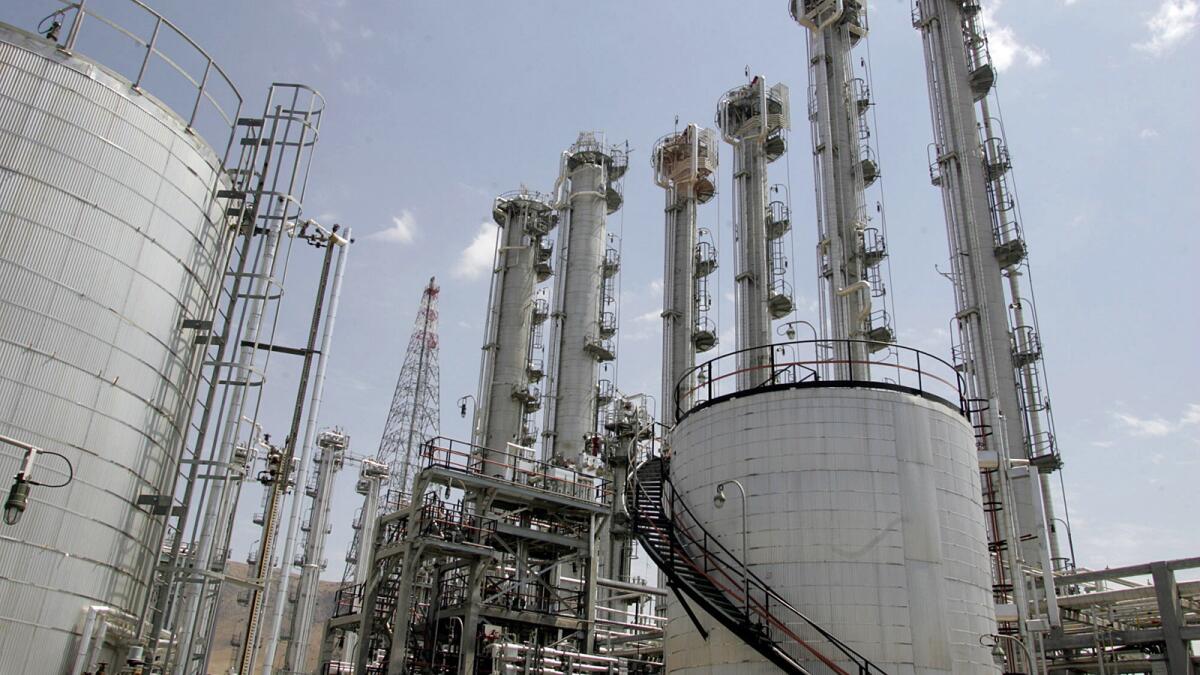Iran nuclear talks again stuck on Arak reactor’s future, official says

- Share via
Reporting from Washington — The future of Iran’s planned research reactor at Arak is again proving a major sticking point in international talks over Tehran’s disputed nuclear program, according to a key negotiator.
Western officials fear that the heavy-water reactor, once operational, could provide a siginficant supply of plutonium.
Plutonium is one of two materials, along with highly enriched uranium, that can fuel a nuclear bomb.
Iran says the 40-megawatt Arak reactor is intended to produce isotopes for cancer and other medical treatments. It agreed to halt installation work at Arak late last year as part of an interim deal to buy time for negotiators to reach a broader accord.
As two days of talks wrapped up Thursday in Vienna, Russia’s chief negotiator said there was “no consensus” among the seven countries on the Arak facility, which is southwest of Tehran.
Russian Deputy Foreign Minister Sergey Ryabkov, talking to Russian journalists Thursday, described Arak as one of three key areas where “blocks of questions” remain. Arak is “still not worked out,” he said, according to the RIA Novosti news service.
Other major unresolved disputes include how much uranium Iran will be allowed to enrich as part of a final deal, and how the United States and other countries would lift sanctions that have crippled Iran’s economy.
In addition, “there is an array of issues that cannot be considered fully resolved yet, and thus cannot be laid out on paper,” Ryabkov said.
For much of this year, diplomats have said they believed they had found a way to ease Western concern about the facility. Reports indicated that Iran had agreed to change the way Arak would be fueled, and to reduce its power capacity, to sharply cut the potential output of plutonium.
The reported consensus had been considered one of the bright spots as negotiations moved toward a Nov. 24 deadline.
Iran and six other countries -- Russia, China, France, Britain, Germany and the United States -- are seeking a comprehensive deal that would ease sanctions on Iran if it accepts limits designed to prevent it from gaining a nuclear weapons capability.
Officials of the seven nations described this week’s talks as they have portrayed other recent meetings. They said they made some progress but did not achieve a breakthrough on the main obstacles to an agreement.
The most important session in Vienna was a six-hour meeting Wednesday attended by U.S. Secretary of State John F. Kerry, European Union foreign policy chief Catherine Ashton and Iranian Foreign Minister Mohammad Javad Zarif. Ashton and Zarif met with principal negotiators of the other countries on Thursday.
With the talks at an apparent impasse on key issues, many outside experts and diplomats have been calling on negotiators to extend the talks.
Zarif, contradicting a widely reported statement by his deputy last week, told journalists that Iran is not seeking to extend talks if negotiators can’t reach a deal before the deadline next month.
U.S. officials said the group has not discussed an extension. But they did not rule out such a move.
Ryabkov said any attempt to extend the talks would require difficult negotiations.
“Obviously, every extension ... will be more difficult than the previous one, and the risk of total failure also increases,” he said. Yet he added, “Achieving a sustainable result ... is more important than meeting a certain deadline.”
For foreign policy news, follow me at @richtpau
More to Read
Sign up for Essential California
The most important California stories and recommendations in your inbox every morning.
You may occasionally receive promotional content from the Los Angeles Times.














